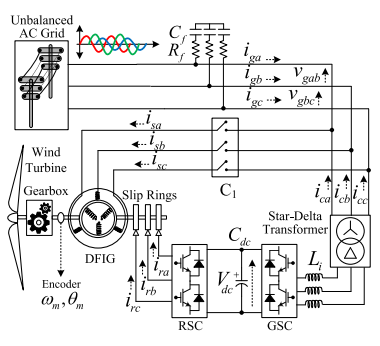Enhanced Control of DFIG Based Wind Energy Conversion System under Unbalanced Grid Voltages Using Mixed Generalized Integrator
Also Available Domains Hybrid Systems|Power Quality
Objective
The main objective of this project is to propose an enhanced control strategy for a DFIG operating under unbalanced grid voltages by using a mixed generalized integrator.
Abstract
In this project, the MGI is a hybrid form of the second and third-order generalized integrators and is employed for positive and negative sequence calculation. The MGI-based enhanced control strategy utilizes the hysteresis band control of rotor currents and grid currents, to generate switching sequences for rotor side converter and grid side converter, respectively. In addition to superior dynamic tracking of reference currents, this scheme eliminates the need for implementation and careful tuning of eight distinct proportional-integral inner current regulators, as is the case with conventional control strategy for the DFIG operating at unbalanced grid voltages. Furthermore, MGI improves the grid synchronization in DFIG system amidst the presence of dc offset and unbalance in the supply voltages. The simulation results can be evaluated by using Matlab/Simulink Software.
Keywords: Doubly-fed induction generator (DFIG), power quality, unbalanced voltages, wind energy conversion system (WECS).
NOTE: Without the concern of our team, please don't submit to the college. This Abstract varies based on student requirements.
Block Diagram

Specifications
Software Configuration:
Operating System : Windows 7/8/10
Application Software : Matlab/Simulink
Hardware Configuration:
RAM : 8 GB
Processor : I3 / I5(Mostly prefer)
Learning Outcomes
- Introduction to Matlab/Simulink
- What is EISPACK & LINPACK
- How to start with MATLAB
- About Matlab language
- About tools & libraries
- Application of Matlab/Simulink
- About Matlab desktop
- Features of Matlab/Simulink
- Basics on Matlab/Simulink
- Introduction to controllers.
- Study of PWM techniques.
- Project Development Skills:
- Problem analyzing skills
- Problem solving skills
- Creativity and imaginary skills
- Programming skills
- Deployment
- Testing skills
- Debugging skills
- Project presentation skills
- Thesis writing skills


 Paper Publishing
Paper Publishing
